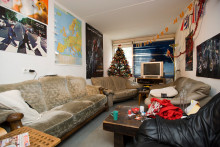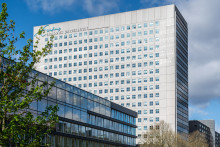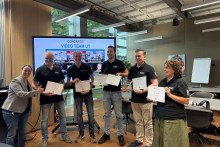`Uncertainty is unavoidable in natural resource management, particularly water management.' Brugnach spoke in her Horst office which was checkered with yellow stickers, each adhering to an item and displaying its Dutch word. `Uncertainty refers to the situation in which a decision maker does not have a unique and complete understanding of the system he or she wants to manage. My work has incorporated the study of ambiguities, a special type of uncertainty, into the decision making process.
`Water management problems tend to be complex and with more than one possible interpretation,' she continued, waving a lock of curls from her eyes. `When decision makers frame a problem, they base it on their own background, scientific discipline, value system, experience, and position. Generally, in water management, the decision making process is collective, involving the participation of multiple stakeholders. This means that there can be simultaneously many different sensible ways of framing a problem.
`As a result, you have ambiguities — it is no longer clear what the problem is about, or what the solution is. These ambiguities are common sources of conflict in water management. Coping with them requires us to learn how to deal with differences as well as creatively envision a shared view, not only of the problem, but also of the solution.'
Brugnach, who is ambiguous about her age, `Somewhere in the middle,' she replied when asked, also emphasized the need for a relational approach to decision making: `Decision makers need to be part of the water management system, and their knowledge needs to be based on relationship. They need to consider questions like: How do we integrate different types of knowledge — factual and local — about a water system? How can we realize that each perspective can only give a partial view of any problem? And how can we accept that the best solution is achieved when all perspectives are considered through reflection, dialog and negotiation?'
`I believe that, when it comes to dealing with uncertainty in natural resource management, it is a matter of accepting that sometimes we know too little, or too differently, or that we just do not know at all.'
With doctorate studies in both Bioresource Engineering and Ecology from Oregon State University and a Computer Science degree from Universidad Nacional del Centro, Argentina, Brugnach more recently spent time as a senior researcher at the University of Osnabrück, Germany. Since joining the Water Engineering and Management group in the Faculty of Engineering Technology last September as Assistant Professor, Brugnach is teaching masters classes and leading an uncertainties discussion group.
When asked if being Argentinean helps her to work with uncertainties, she laughed. `In my country, we live in constant uncertainties! While Germany and the Netherlands are more controlled, fixed systems, we Argentineans do not have much control over our political or economic reality. Sometimes, it even feels completely out of our hands.' Returning to her home country is not likely. `Research funds are limited and it is difficult to reenter the system when you have been abroad for so long. Besides the interdisciplinary work that I do is more accepted here. Germany and the Netherlands are great in that respect. But I do miss how easy it is to socialize at home and the spontaneity of the people.'
Brugnach is also a single mother of daughter Manuela, 14, and they enjoy going to the cinema together on Sunday afternoons. `Being a mother and a scientist is a challenge,' she said. `I try not to travel too much even though I was in Japan last October and will be in Canada this summer.' Meanwhile, Brugnach starts every morning with yoga. `It's the one thing I do with certainty!'
 |
| In her free time, Brugnach enjoys painting with acrylics and reading José Saramago, Portuguese novelist and Nobel Prize winner for Literature in 1998. (Photo: Gijs van Ouwerkerk) |







